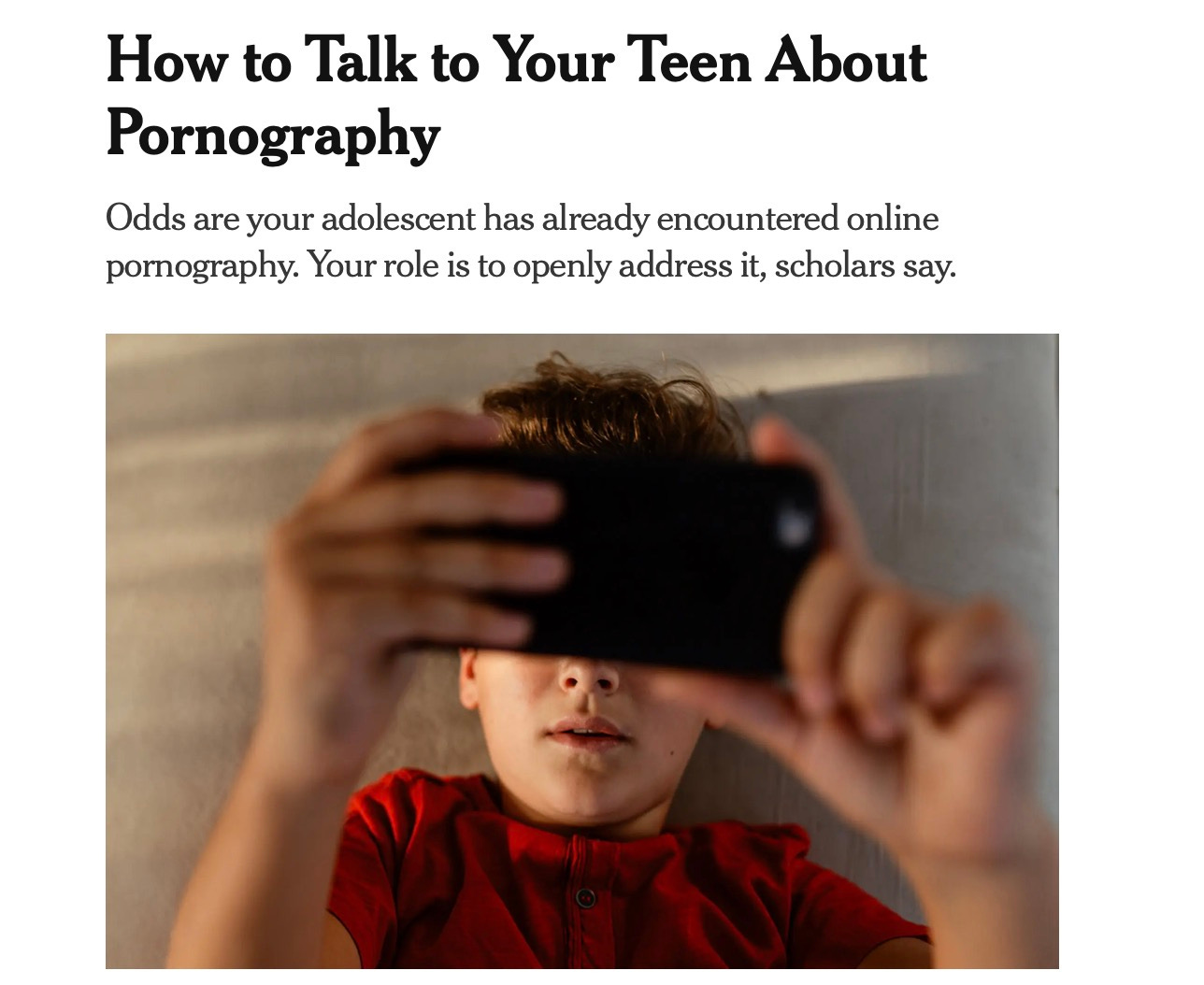Try this one weird hack to get your kids to stop watching hardcore porn
Little-known trick to prevent children from consuming sick, debilitating sex videos
“More adolescents than ever are watching [porn],” the New York Times said this week. “What’s needed, researchers say, are frank conversations and ‘porn literacy.’” Gee, my thought is that if underage kids are consuming pornography, we don’t need them to be more “literate” about it, we need them to stop watching it. This is easy. It feels pretty easy, right? The solution to kids watching porn should be “Kids don’t watch porn.” Very simple. Aim for that, make it happen, and you’ve solved the problem overnight.
The Times isn’t interested in that kind of simple and rather obvious solution, however. See if you can detect a theme running through their report:
“I always have to be careful to couch things by saying, ‘I’m not saying porn is good — but I am saying it’s a reality … You can stick your head in the sand and pretend it doesn’t exist … but you have to have a realistic understanding of what’s happening.” …
[S]cholars who study the adolescent use of online pornography say that the behavior is so commonplace and impossible to prevent that a more pragmatic approach is required. …
The realpolitik approach has been endorsed by recent scholarly papers that call for teaching adolescents “porn literacy,” having doctors ask young people about their pornography viewing and starting conversations between teenagers and their parents. …
“Kids are going to be looking at porn whether you talk to them or not,” he said. “And so if they’re going to look at porn, and you want to have any influence on their life, you have to have this conversation.”
The simmering undercurrent in these pathetic equivalencies is clearly something like this: “Kids are going to watch porn no matter what. There’s nothing, literally nothing, we can do to stop them.” Well, that’s sort of stupid, isn’t it? Of course there are a great many ways to prevent your children, even your older children, from watching porn. Chief among those methods would be—now call me crazy here—not giving them a smartphone at a young age. That’s easy, so easy it almost beggars belief that it has to be said. But of course that’s a no-brainer. Data indicate that most kids get their first smartphones by 11 years old. Is there any doubt, any at all, that this is a major driver of the acute and ongoing adolescent porn-viewing epidemic? Having a pocket-sized Internet-accessible supercomputer on you at all times, something that’s easily hidden, easily transported to private places away from adult supervision—of course this makes porn consumption much easier. This is simplicity itself—so much so that in an accompanying explainer article, the Times included—you guessed it—a photo of a kid on a smartphone!
Amazingly, at no point in its news report does the New York Times make mention of this—which should tell you how desperately unserious so many people are when it comes to fixing this kind of problem. It is beyond strange that a major newspaper could run an entire article about this crisis—underage children are watching lots of porn—and neglect the major factor that has driven this development. Why do that? Why ignore the most obvious, most easily accessible exposition here?
There is a weird defeatist impulse that undergirds much of modern parenting. Many parents for years have deflected to this kind of helpless abandon when it comes to raising their children: “Kids are going to drink alcohol no matter what. Might as well let them do it at home.” “Kids are going to be having sex even if you don’t want them to. Might as well give them IUDs and condoms.” The type of parent who says this sort of thing is generally the type of parent who doesn’t really care one way or the other—it’s less an admission of defeat and more of a statement of values—so it might surprise you to learn that it is in fact possible to raise children to adulthood without allowing them to debauch themselves on a regular basis. You can do it! But it does take extra work, a decent bit more proactive, involved parenting, which many parents today are increasingly unwilling to do for a variety of reasons.
Yet that is why this porn crisis is so strange. The easiest, best way you can avoid that is to just not give your kid a smartphone. That’s it. It’s pretty much no work at all, in fact it’s an absence of action more than anything. Don’t give your kids a highly private, highly portable computer device when they’re 10 years old—heck, don’t let them have one until they’re 18. Boom, done, suddenly they’ve lost about 80% of their ingress into the unfettered Internet, and with it a large part of the porn superhighway.
You might counter that it is impractical to not give your small child a phone; that he desperately needs it; that without it he will be bereft and debilitated in some way; and that the consequent risk that he will watch porn is worth it so that he can have his own private mobile device. Of course this is wrong. A child doesn’t need a smartphone. There is nothing for which he needs a smartphone that a home computer can’t provide; and a computer is considerably easier to police and supervise than a phone.
I really think it is vital for parents to know this: You can, in fact, direct and control a considerable amount of your child’s upbringing to ensure his well-being and healthy development. I know, the reigning parenting experts have insisted for years that this is not true—that our children are going to be exposed to harmful and inappropriate materials and experiences “no matter what”—and that the best we can expect as parents is to have a limp, effete “conversation” with our kids every now and then in the hopes of having some sort of “influence” over their lives. In its explainer, for instance, the Times quotes an expert who urges parents to "help [their] child become a conscious consumer.” Of pornography, people!
All of this is stupid and untrue. You can be a proactive force for good in your child’s life on a daily basis; you can pretty rigorously guide your child toward good things and away from bad things instead of settling for a lame, ultimately crippling style of weak parenting. It doesn’t mean you’ll be successful every time, of course; everybody has gotten into something rotten at some point or another in their lives. But I can guarantee you the parent who takes the initiative on this sort of thing is going to have a better outcome than the parent who takes the New York Times’s advice on it.
If you want to sort of lay down and meekly submit to letting your child view destabilizing, quasi-traumatic sex videos online, sure, it’s going to happen. If you don’t want that to happen, you can pretty well make sure it doesn’t. Don’t believe the strange, feeble people who tell you otherwise. Also don’t give your children smartphones. Just don’t.




